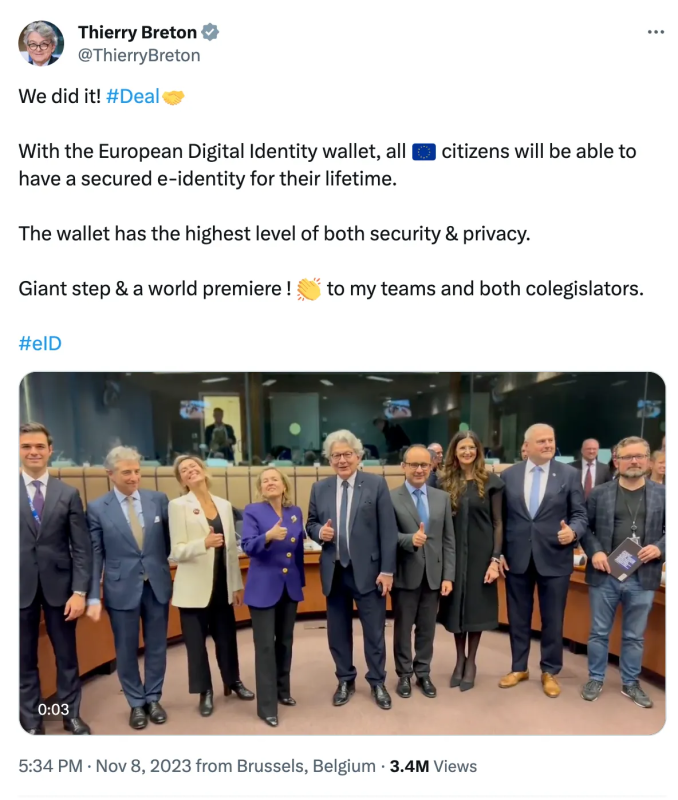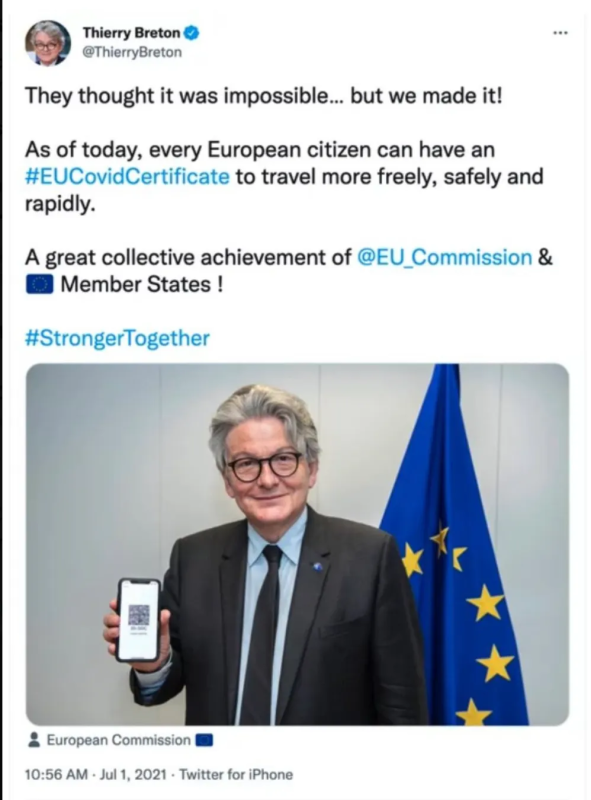Last Wednesday, Thierry Breton, EU’s Internal Market Commissioner, proudly announced on Twitter/X that he had struck a deal with MEPs to create a European “digital identity wallet,” which would permit all EU citizens to have “a secured e-identity for their lifetime.”
According to the European Commission’s own website, the European Digital Identity can be used for a whole range of transactions, including providing personal identification on and offline, showing birth certificates and medical certificates, opening a bank account, filing tax returns, applying for a university, storing a medical prescription, renting a car, or checking into a hotel.

Several people, including Dutch MEP Rob Roos, have raised concerns that a centralised digital ID could put Europeans’ privacy and mobility rights in jeopardy. A letter signed by over 500 “cybersecurity experts, researchers, and civil society organisations from across the globe,” warns that the proposed digital ID regulations will reduce rather than enhance citizens digital security.
But one of its leading architects, Internal Market Commissioner Thierry Breton, maintains that “the wallet has the highest level of both security & privacy,” while EU President Ursula von der Leyen insists that this is “a technology where we can control ourselves what data is used and how.” So either critics are overplaying civil liberty and privacy concerns, or the technology’s defenders are downplaying them. They cannot both be right.
In theory, a universal European digital ID could be programmed on a permanent basis in such a way that the citizen has full control over which parts of his or her “digital wallet” he shares at any given moment, and which he or she does not share. We might have little to worry about if a European digital ID was programmed now and forever by people who took privacy seriously and were not inclined to exploit the technology at their fingertips to “nudge” – or even “shove” – citizens into complying with their policies concerning disease control, non-discrimination, war propaganda, or climate change.
But in practice, it would be highly naive to assume that a programmable Europe-wide digital ID, controlled by a centralised bureaucracy would not, sooner or later, be exploited to “nudge” (or shove) people into complying with the policies that happen to be favoured by the “powers that be.”
And it does not require a wild leap of imagination to envisage the sorts of ways a European digital ID could be leveraged to erode the equality and freedom of Europeans, since the very same individuals that are the public face of this digital ID initiative were the ones who set in motion the most pervasive system of bio-surveillance in the history of Europe, namely the so-called “Covid digital certificates.”

The operation of the Covid digital certificates, which was approved by both the European Commission (the same one now pushing for a digital ID system) and the European Parliament, can give us a fairly clear idea of the uses to which European technocrats are likely to put a digital ID system, if given the chance.
The Covid digital certificate was used to compel citizens who had not received a Covid vaccine within a certain time period to obtain a costly and inconvenient Covid test every time they crossed a European border, and was even used to deny entry to unvaccinated citizens at cultural and recreational venues across Europe. In other words, the Covid digital certificate served as a mechanism for coercing citizens into injecting a certain medication into their bloodstream, and created a two-tier society, in which the unvaccinated were treated as a new social and political underclass.
Now, imagine if a centrally controlled European digital certificate was offered to all European citizens as a tool for accessing a wide range of services, from banking, air travel and hotel stays to car rentals, access to recreational venues, and access to online digital services. Initially, presumably the certificate would be optional and citizens could use other methods for validating their identity. Then, under the pretext of enhancing citizens’ “security,” the certificate might very well become obligatory for an increasing number of transactions.
The next step would be to gradually expand the information contained on the certificate, and use the certificate as a way to deny or approve citizens’ access to certain services based on their spending habits, their vaccination status, or their “social credit” score. Of course, this is not something we can be 100% certain will happen. But the recent implementation of vaccine apartheid in Europe should disabuse us of any illusion that Europe’s political leadership are committed to respecting and defending our civil liberties or our equal access to public amenities and services.
Politicans like Thierry Breton and Ursula von der Leyen, and those MEPs and member state goverments that cheered them on during the pandemic, were prepared to treat citizens like cattle or disease vectors to be vaccinated and tested en masse, with scant regard for their personal medical history and risk factors. It is surely only a matter of time before people with this sort of contempt for individual liberty would be inclined to take advantage of a technology like a universal digital ID as a lever to control people’s private choices with a view to advancing their own careers and policy goals.
Quite a few citizens said “no” to an experimental vaccine, and quite a few citizens still question the scientific and political rationale for imposing burdensome carbon taxes, forcibly expropriating farmland based on climate directives, living in “15 minute cities,” making space for transgender ideology in their hospitals and classrooms, or abstaining from whatever the powers that be deem to be “hate speech.”
What better method to induce public compliance with unpopular or controversial public policies and laws than to reward compliance with enhanced mobility and enhanced access to social amenities and services, and punish non-compliance with reduced mobility and reduced access to services and amenities? Isn’t that exactly what the digital Covid certificate, a brainchild of the same Commission, did?
Obviously, advocates of a European digital ID will publicly claim they are only interested in promoting the security of our transactions and protecting our privacy. But since these are the very same people who dare to claim that medical segregation and coercion via vaccine passports “reassures us of (the) spirit of an open Europe, a Europe without barriers,” their assurances regarding citizens’ privacy and liberties have no credibility whatsoever.
Republished from the author’s Substack
Published under a Creative Commons Attribution 4.0 International License
For reprints, please set the canonical link back to the original Brownstone Institute Article and Author.









